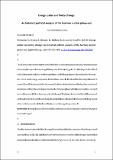Energy justice and policy change : an historical political analysis of the German nuclear phase-out
Abstract
The German government presented the decision to phase out nuclear energy as a nationally accepted rebalancing of inequality in the energy sector. We expose how this radical change was delivered through a myriad of change agents, most notably through the rise of small energy companies. Critical junctures, in this case the Chernobyl disaster rather than Fukushima, offer moments in time when national policy systems are destabilized. They provide opportunities for changing policy in a perceived pro-energy justice direction if a new consensus can be forged. The paper concludes with a discussion on how energy scholars must engage more with policy analysis frameworks if long-term effective solutions are to be found to persistent energy inequalities.
Citation
McCauley , D , Brown , A , Rehner , R , Heffron , R & van de Graaff , S 2018 , ' Energy justice and policy change : an historical political analysis of the German nuclear phase-out ' , Applied Energy , vol. 228 , pp. 317-323 . https://doi.org/10.1016/j.apenergy.2018.06.093
Publication
Applied Energy
Status
Peer reviewed
ISSN
0306-2619Type
Journal article
Description
Funding: ESRC (ES/I001425/1).Collections
Items in the St Andrews Research Repository are protected by copyright, with all rights reserved, unless otherwise indicated.

